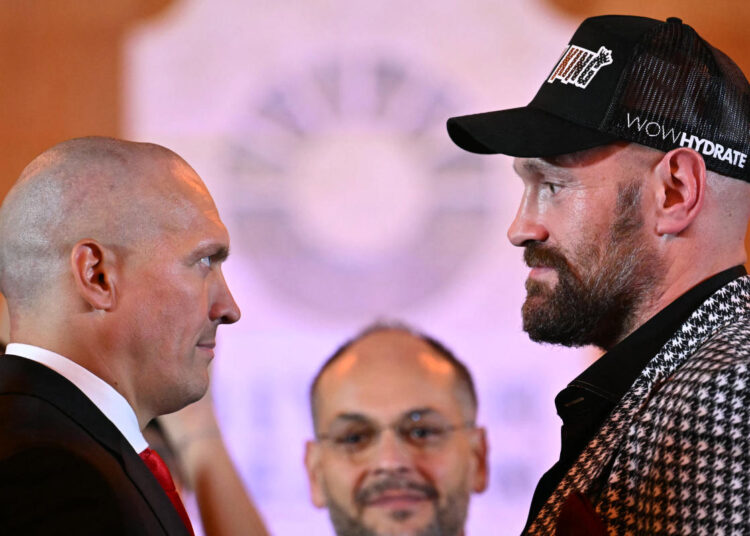Tyson Fury feels confident that he’ll encounter a completely clean champion when he opposes Oleksandr Usyk again Dec. 21 in Riyadh, Saudi Arabia.
The former WBC heavyweight champion pays out of his own pocket before each of his fights for even more Voluntary Anti-Doping Association testing than typically is performed for world title fights. Las Vegas-based VADA has been considered the gold standard for performance-enhancing drug testing in boxing since 2012 and randomly tests through blood and urine samples for approximately 200 banned substances.
“As long as both fighters are being tested regularly, that’s all anyone can do,” Fury told Uncrowned. “There’s always gonna be people who’ll be able to cheat the system. But as long as they’re both tested regularly, then there’s nothing much more that anyone can do about that.”
Usyk also pays extra money for additional VADA testing, in part because the former undisputed cruiserweight champion usually fights taller, heavier and harder-hitting opponents in the heavyweight division.
England’s Fury, 36, and Ukraine’s Usyk, 37, are anomalies, however, in that their guaranteed purses for back-to-back heavyweight title fights this year combined to exceed $200 million. For four-round fighters who box for low four-figure purses and work full-time jobs, comprehensive PED testing in and out of competition is so prohibitively expensive that they’re left to wonder why their lives aren’t valued as much as those of world champions and contenders who have the financial wherewithal to cover costs of VADA testing or have promoters more committed than competitors to ensuring that cheaters cannot gain artificial advantages over opponents.
Bob Arum’s Top Rank Inc, for instance, has spent almost $500,000 on VADA testing for cards it has promoted in 2024, mostly in the United States. Top Rank can allocate that much money from its budget for PED testing because it is paid more than $90 million annually as part of its exclusive rights deal with ESPN, which will conclude at the end of July 2025.
Arum admits, though, that thoroughly testing every fighter on every card would become cost prohibitive even for a company with the deep pockets Top Rank possesses.
“You can’t really test a four-round fighter or a six-round fighter every fight,” Arum said. “But you certainly should have a fund to do random testing of preliminary fighters. That’s a good way to determine whether a fighter is cheating, particularly if it’s really random. I think that’s what they do in the NFL.”
Boxing’s long-documented need for federal oversight enables some brazen boxers to circumvent consistent testing and benefit from PEDs. Despite the existence of regulatory agencies throughout the U.S., the financial burden of testing obviously isn’t something taxpayers should absorb to enhance safety in an inherently dangerous private business.
Top Rank’s proactive approach to PED testing isn’t the norm, but such competitors as Al Haymon’s Premier Boxing Champions and Eddie Hearn’s Matchroom Boxing often subsidize testing in the U.S. to varying degrees as well.
Turki Alalshikh, the Saudi Arabian fight financier whose government fully funded both Usyk-Fury fights, believes it is imperative to test every boxer that competes on each card organized by his country’s General Entertainment Authority. The GEA, whose budget for the sport exceeds every entity in boxing combined, covered comprehensive PED testing for all “Riyadh Season” shows this year in Saudi Arabia, England and the U.S. except an event overseen by Oscar De La Hoya’s Golden Boy Promotions that took place Nov. 17 in Riyadh at Kingdom Arena, where the card headlined by the Usyk-Fury rematch will be held.
Uncrowned was unable to confirm by the time this story was published why blood and urine samples for all 12 fighters who competed Nov. 17 in Riyadh weren’t tested at a lab accredited by the World Anti-Doping Agency, in accordance with VADA’s stringent standards. Regardless, the pledges by Arum and Alalshikh to more consistent VADA testing and the WBC’s annual commitment of $125,000 to operate its “Clean Boxing Program” for all of its champions and contenders ranked in the top 15 in all 17 divisions are considered positive steps toward limiting cheating in a brutal sport that can cause death.
“It’s not how often you’re tested,” Margaret Goodman, VADA’s president and board chairman, said. “It’s more that the testing is more thorough itself, and that it’s unannounced and random. So, I try to concentrate on that part of it. It is expensive, and I get that. But that’s because it’s done the right way – by the highest-trained, certified doping officers you can find. That’s a reason why we always stay with Clearidium. Their tests are expedited and we’re using WADA-accredited labs. That’s the best way to do it. I’ve talked to different commissions about that, commissions that don’t use WADA-accredited labs, and hopefully they will understand that’s something different that they need to incorporate [into their programs].”
Commission testing, funded by state and tribal governments in the U.S., is mostly performed more intermittently than privatized VADA testing and isn’t considered consistent enough to consistently catch cheaters. In fact, even advanced VADA testing, as thorough as it is, isn’t enough to deter some fighters from further jeopardizing the health of opponents because in many cases so much money is at stake.
Promoter Lou DiBella, long a vocal advocate of appropriately punishing PED abusers, particularly repeat offenders, believes boxing has missed countless opportunities to take stands when high-profile fighters test positive for banned substances.
“I think we’re basically almost nowhere in terms of PED testing,” DiBella said. “You can’t sue another fighter, effectively, who cheated against you, even in breaking the laws of boxing, because a court already has ruled that the whole WBC testing process is arbitrary. That’s why they overturned what was Deontay Wilder’s victory in court against [Alexander] Povetkin.”
Wilder wasn’t ultimately awarded a $4.3 million purse that was held in escrow even after Russia’s Povetkin tested positive for the banned substance meldonium. Wilder, then the WBC heavyweight champion, had already flown to Moscow to defend his belt versus Povetkin in May 2016 when he was informed Povetkin failed a VADA test.
“So, we’re really nowhere,” DiBella continued. “And let’s face reality — you can’t afford to do VADA testing for the vast majority of fights that happen worldwide. And why are we even talking about VADA testing across the board, when in the United States of America, in most states, you fight without a f***ing head test? You can fight after being knocked out 10 times. There’s no standardized health and safety regulations across the United States, across the world, across commissions.
“There’s completely inadequate health and safety safeguards throughout boxing. So, let’s not think somehow you’re gonna be able to eradicate a problem with performance-enhancing drugs, when frankly the expertise keeps moving technologically beyond the testing. You can’t keep up with the cheaters. The cheaters are always ahead of you. Not only that, but when someone does get caught, there’s completely arbitrary enforcement, which is why the courts are not gonna be of great help to the fighters that are victimized by being on the wrong end of a cheat.”
Mexican superstar Canelo Alvarez, boxing’s biggest star in the U.S., served a six-month suspension issued by the Nevada State Athletic Commission in 2018 when he tested positive for clenbuterol before his second fight against rival Gennadiy Golovkin. Polarizing junior welterweight star Ryan Garcia is serving a one-year suspension imposed by the New York State Athletic Commission because he tested positive for ostarine, which led to changing the result of his 12-round, majority-decision upset of former undisputed lightweight champ Devin Haney on April 20 to a no-contest.
English welterweight contender Conor Benn had his two-year suspension lifted last month by the National Anti-Doping Panel in the United Kingdom. Benn failed two VADA tests for the banned fertility drug clomiphene before he was scheduled to face English generational rival Chris Eubank Jr. in a high-profile pay-per-view showdown in October 2022 at O2 Arena in London.
American heavyweight contender Jarrell Miller, the sport’s most notorious repeat PED offender, continues to earn six- and seven-figure purses, most recently on a “Riyadh Season” card Aug. 3 at BMO Stadium in Los Angeles.
The reputation of former featherweight and junior lightweight champ Oscar Valdez remains stained from his PED incident three years ago. Mexico’s Valdez insists he made an innocent mistake, yet he has resigned himself to the reality that some skeptical people will always call him a cheater.
Valdez nevertheless remains committed three years after his PED ordeal to thorough testing and educating boxers about the potential pitfalls of using unregulated supplements, which Valdez contends caused him to test positive for phentermine in August 2021.
The Pascua Yaqui Tribe Athletic Commission licensed Valdez to battle Brazil’s Robson Conceicao the following month in Tucson, Arizona, because WADA, unlike VADA, permits the use of phentermine both in and out of competition. All state and tribal commissions in the U.S. affiliated with the Association of Boxing Commissions follow WADA’s guidelines.
Valdez, who was knocked out in the sixth round of his 130-pound championship rematch with Emanuel Navarrete last Saturday night at Footprint Center in Phoenix, was tested three times by VADA before his second fight with Navarrete. The two-time Mexican Olympian pointed out to those that think he intentionally ingested phentermine that he insisted on VADA testing for him and his opponents from the time when he was an emerging eight-round fighter.
“We’re always advocates for a clean sport,” Valdez said. “In boxing, you’re always risking your life. We always put up the VADA testing for each and every fight. So, when we came out with the positive [test], it doesn’t make sense to [demand] VADA testing if we’re gonna come out positive. We just want everyone to have a clean sport, to have a fair game, and get these things done. The risk of people’s lives inside that ring makes it very important.”
Read the full article here


























